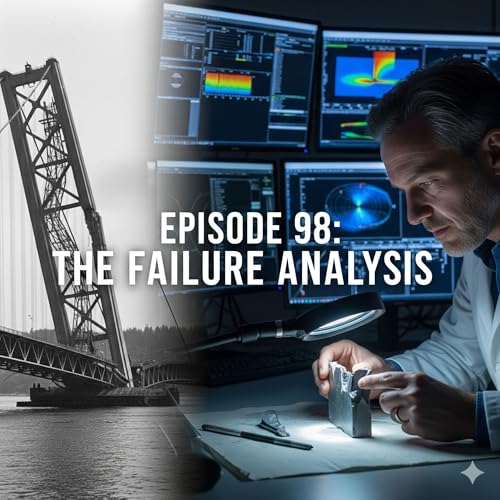
Episode 98 - The Failure Analysis
No se pudo agregar al carrito
Add to Cart failed.
Error al Agregar a Lista de Deseos.
Error al eliminar de la lista de deseos.
Error al añadir a tu biblioteca
Error al seguir el podcast
Error al dejar de seguir el podcast
-
Narrado por:
-
De:
This episode delves into the often-uncomfortable but absolutely essential topic of failure in engineering and construction. It reframes failure not as something to be hidden or ashamed of but as a powerful and indispensable catalyst for learning, innovation, and long-term progress. The discussion moves "beyond blame" to explore the rigorous, systematic, and deeply scientific process of failure analysis, presenting it as a kind of "forensic investigation" that seeks to understand not just what happened but why it happened, uncovering the complex, often-interconnected, root causes of a problem.
The episode then broadens our very definition of failure, showing that it's not just about catastrophic collapses. A failure, it argues, can be any deviation from a desired outcome, from a project that goes over budget or falls behind schedule to a building that fails to meet the long-term performance needs of its occupants. The conversation highlights how a "systems thinking" approach is essential for understanding these more subtle, often-systemic, failures, revealing the hidden feedback loops and unintended consequences that can lead to undesirable outcomes. It's about moving from a simple, linear, cause-and-effect mindset to a more holistic and nuanced understanding of a project as a complex, interconnected system.
The latter half of the episode explores how the lessons learned from these failures—both large and small—are systematically codified and integrated into the very fabric of the industry. It shows how the meticulous, often-tragic, investigations of past disasters have directly led to the development of the rigorous building codes and safety standards that protect us today. The episode concludes by affirming that our safest, most resilient, and most innovative structures are, in a very real sense, built on a foundation of past failures, a testament to our collective ability to learn from our mistakes and to continuously strive for a better, more intelligent, and more responsible way of building.


